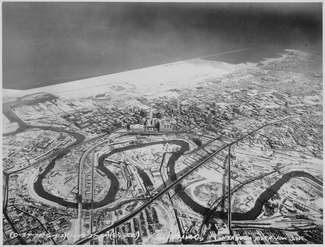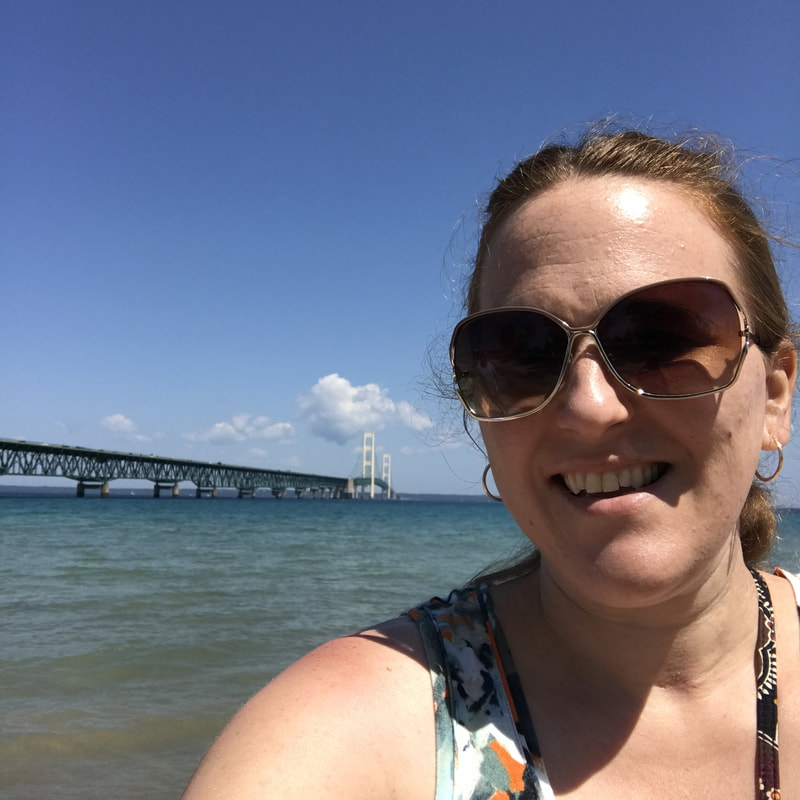 Cleveland from the air, 1937 (Source: NARA)
Cleveland from the air, 1937 (Source: NARA) If you follow my blog, or know me personally, then you know that I was born and grew up in the suburbs of Cleveland. My working-class (i.e. poor) great-grandparents emigrated from various parts of Europe between 1890 and 1920 and settled in Cleveland. ALL of my family's American history remains there, along with most of my close living relatives. I'm not there, and for someone who values family history so much, it's often hard to be away from the place I came from.
Most people think fondly of the place in which they were raised, but Clevelanders have a unique pride that is truly difficult to explain to an outsider. Why do I personally take so much pride in a city? True, some of it has to do with ordinary nostalgia, but I've come to realize that most of my pride is far deeper than that. And it has been through my family history research that I have come to this realization: my family, along with hundreds of others like mine, literally built this city. My great-grandfathers sacrificed hours upon years of their lives in foundries and steel mills, creating the materials and tools that were building not just Cleveland, but cities and infrastructure all over America. And maybe I've always known that my ancestors "worked in the mills," but actually seeing "Steel Mills" under the 'Industry' section of my great-grandfather's 1920 census form and "Ferro Machine Foundry" listed as employer on my other great-grandfather's WWI draft card - it makes my pride for my family AND my city grow exponentially.
Cleveland saw an immense population growth during the 30-year span when my immigrant ancestors arrived; the population grew from about 260,000 to 796,000 between 1890 and 1920, when the city was the 5th largest in the U.S. Even though they didn't have a lot of money, my grandparents came of age in a thriving city full of growth and opportunity. By contrast, I grew up in a Cleveland that was constantly being joked about, a Cleveland that was losing jobs, losing people, losing hope. We took the jokes in stride, and when people teased us about our river catching on fire, we laughed it off, but inside we knew that that pollution, as horrible as it was, was our ancestors' livelihoods, and represented food on the tables and clothes on the backs of our working-class families. No, our sports teams never win anything, but, perhaps against better judgment, we never give up on them, and that is a quality that is in our blood. My ancestors never gave up, no matter what life threw at them. And if there is one thing in life I want my kids to learn, it is to never give up.
I've thought of what my great-grandparents and grandparents would think of the Cleveland of today. They would be proud, and they would recognize some of the economic and social growth and excitement that is going on there today. My great-grandparents came to Cleveland to reinvent themselves, to improve their lives, to build a city that is better for their children. That's exactly what Cleveland is doing today.
Here links to some websites that are great resources for Cleveland history:
Encyclopedia of Cleveland History by Case Western Reserve University and the Western Reserve Historical Society
The Cleveland Memory Project by Cleveland State University Libraries
Cleveland Historical by the Center for Public History and Digital Humanities at Cleveland State University
Cleveland, Ohio History by the Ohio History Connection
©2014, copyright Emily Kowalski Schroeder


